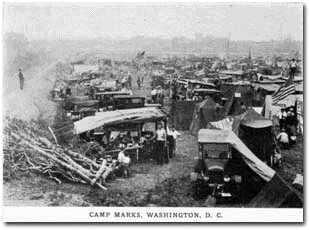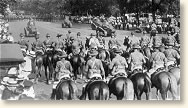Contents
World War One

There are other times in American history when the rights of American citizens to speak freely were judged to be more dangerous. The World War I era is a perfect example. The U. S. waited nearly four years before entering the war on the side of the British and French against the Germans. Once we entered the war, U.S. citizens were fiercely prosecuted for speaking out against the war.
After WWI ended, Congress passed a bill that rewarded veterans with a cash bonus for their service. The bonus was scheduled to be paid in 1945. However, the Great Depression of the 1930s caused many WWI veterans to need the government to change the timetable and pay them their bonus then, when they really needed the money. These veterans thought that as American citizens and war veterans, they had the right to march in Washington D.C. to demand that the government pay them their bonus in 1932. Many of them were jobless. After all, they had families to support, and there were no jobs. Their children were going hungry (“The Bonus Army”). World War One was a vicious, horrible, pointless European war. President Woodrow Wilson had us enter this war because the Europeans were unable to end it. Americans were harassed, and our government did not tolerate any dissent.
When push came to shove, “The Bonus Expeditionary Force”, which was made up of American citizens and veterans who had fought in Europe, where they were gassed, lived in trenches, fought in our infant Air Force and had survived the worse war ever fought, went to Washington. In May of 1932, during the worst of the Great Depression, these brave men marched in Washington to petition the government for payment of their “bonus”. They set up camps throughout Washington, the largest of which housed over ten thousand ex-soldiers.
These were American citizens and war veterans, exercising their rights under the First Amendment.
What was our government’s response? On July 28, 1938, military forces under the command of General Douglas MacArthur, used tanks, and cavalry, and fired upon these veterans. They also set fire to their shacks and drove them out of Washington. Four good American military veterans were killed that day. These were American citizens, war veterans, trying to express their right to speak freely, assemble peacefully and petition our government for redress of their grievances (“The Bonus Army”). So what were their rights? Did they have the right to speak freely? Did the Bill of Rights protect them? Again I must ask. Do we truly have this right? Or are “rights” subject to the whims and wills of our government?